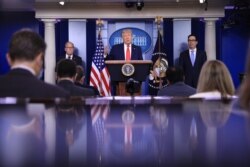Democratic presidential candidate Joe Biden’s embrace of more ambitious and increasingly expensive plans to revive the U.S. economy strives to bolster his support among progressives and blue-collar workers in key industrial battleground states.
“It's an opportunity to finally and fully live up to the words and the values enshrined in our founding documents of this nation that we're all created equal or entitled to be treated equally," said Biden when announcing his “Build Back Better” economic recovery plan last week.
The presumptive Democratic Party presidential nominee stopped short of endorsing sweeping programs like universal health care coverage called for by former progressive presidential rival Senator Bernie Sanders.
But Biden’s plans would still increase taxes and add between $6 trillion and $8 trillion in government spending over the next decade, at a time when government stimulus spending to combat the economic impact of the coronavirus is expected to increase the budget deficit to a record level of $3.7 trillion by the end of the year.
The coronavirus pandemic has severely disrupted the U.S. economy, forcing widespread business closures to stop the spread of the deadly infection, causing unemployment to rise from 4% to more than 11%, and disproportionately impacting minority communities and low-wage workers.
“What the pandemic has done is really pulled back the curtain on a set of structural, meaning lasting, inequalities in this economy that are literally devastating communities as we speak, often communities of color,” said Jared Bernstein, an economist with the Center on Budget and Policy Priorities and informal adviser to the Biden campaign.
Made in America
Citing the pandemic-driven economic recession, along with nationwide racial inequality protests and the increasing climate change threat posed by rising temperatures and sea levels due to man-made pollution, the traditionally moderate Biden said bold measures are needed to deal with these unprecedented crises.
Biden’s “Build Back Better” agenda is based on recommendations from his “Unity Task Force” that included supporters of progressive presidential rivals Sanders and Senator Elizabeth Warren to solidify broad party support for the Democratic nominee to defeat President Donald Trump in the November presidential election.
Biden still does not endorse Sanders’s proposals for federal job guarantees, nor for Medicare for All, a sweeping government-funded health care plan, nor for the Green New Deal proposed by Congresswoman Alexandria Ocasio-Cortez, but his new plans are more expansive and expensive than in the past.
In addition to extending unemployment benefits and support for affected businesses during the pandemic, Biden wants to increase the minimum wage to $15 an hour and increase job training programs that target minorities and women.
To boost manufacturing, create 5 million new jobs and make American companies less dependent on Chinese exports, Biden proposes spending an additional $400 billion to increase U.S. government purchases of products made in America, including vital protective gear and medications needed to cope with the coronavirus pandemic.
“Even before Biden has proposed adding an extra $400 billion, about 2% of GDP (Gross Domestic Product) to our procurement, we already procure about $600 billion, almost 3% of GDP per year. OK, so that is a lot of procurement,” said Bernstein.
Biden would allocate $300 billion for innovation, research and development to help U.S. companies compete in the global market.
The former vice president would also raise taxes on U.S. companies outsourcing jobs overseas, crack down on businesses that advertise Chinese imported goods as Made in America, and lead an international effort to counter China’s unfair trade practices.
Plagiarizing Trump
President Trump has said Biden is plagiarizing his America First agenda to win back traditional Democratic working-class voters in the key industrial heartland states of Michigan, Pennsylvania and Wisconsin, that Trump won in 2016.
“He said the right things because he's copying what I've done. But the difference is he can't do it and he knows he's not doing that,” said Trump last week about Biden’s economic plans.
Trump’s approach to protect American jobs and industries has been to cut corporate taxes and renegotiate trade agreements, but the president has not offered any long-term plan to deal with economic fallout from the pandemic.
“The president really has not given us much of an economic vision for the next four years at a time when we need it the most, as the economy is in its biggest freefall since the 1930s,” said Brian Riedl, an economist with the conservative Manhattan Institute.
Trillions more
This week, Biden also released a $2 trillion clean energy and infrastructure plan that would increase investments in energy efficiency and electric vehicles. While less ambitious than the Green New Deal, this plan would strive to end all fossil fuel-based energy production by the year 2050. Biden’s Unity Task Force also set a goal to install 500 million solar panels, and 60,000 made in America wind turbines.
Biden in the past also proposed a separate $1.3 trillion infrastructure plan to improve roadways, bridges, airports and expand high speed rail service in the U.S.
His more moderate health care alternative to Sanders’s Medicare For All is still projected to cost $1 trillion to expand subsides to low income families, and his education and housing assistance proposals could add another $2 trillion in spending.
Biden’s advisers argue those long-term programs will be fully funded by tax increases, mostly on the wealthy. Conservative critics say Biden’s costly programs will increase the budget deficit to dangerous levels, and his proposed taxes and regulations will stifle an economic recovery. But Riedl says Republicans are seen as disingenuous on fiscal responsibility issues, after they passed corporate tax cuts that greatly increased the deficit.
“Republicans have lost a lot of credibility on the deficit, and they're simply not talking about it anymore because the topic puts them on the defensive on the tax cuts,” said Riedl.














